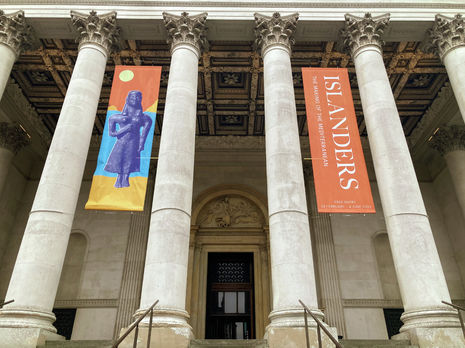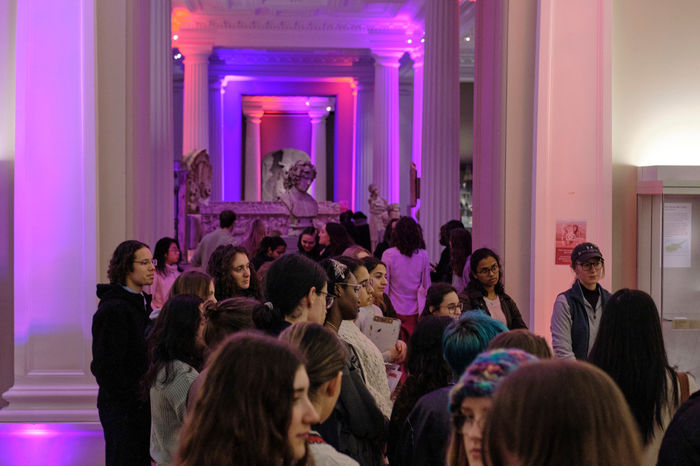Finding wisdom in ancient waters: Islanders: The Making of the Mediterranean at the Fitzwilliam Museum
Jamie Chong reflects on what post-Brexit Britain can learn from the vibrant trading cultures of the ancient Mediterranean

As I walked into the Fitzwilliam Museum, I just had one question: in post-Brexit Britain, what can we learn from the islanders of the ancient Mediterranean? At its heart, this was a question of identity – of what it means to belong to both an individual culture and a collective one. Islanders: The Making of the Mediterranean, running until the 4th of June, demonstrates how individual islands could flourish alongside the development of a Mediterranean identity.
The identity of islands is, like the waters that surround them, fluid and adaptive
Island identity depends on trade. This fact is made clear from the beginning of the exhibition, and it is a fact Britain still reckons with as we navigate our newfound ‘sovereignty’. Traders transported many objects, from pots to perfume, across the Mediterranean Sea, but they also carried with them ideas and cultural practices that were disseminated, distorted and ultimately absorbed. The identity of islands is, like the waters that surround them, fluid and adaptive. To the sound of the ocean rushing through the speakers, I wandered among the things that washed in on merchant boats to those ancient ports of Cyprus, Crete and Sardinia. It is impressive how much we can learn from mundane objects – fragments of daily life – as opposed to the sleek marble art we inherit from the classical age. These are objects made to be held and transported, and it is in these journeys that we can learn the most.
Much like the ancient cultures it examines, the Fitzwilliam’s exhibition is varied and various. It highlights the industries that developed in different parts of the Mediterranean, from glassblowing to metalwork. It also reveals how wide-reaching ancient trade routes were. There is a statue found in Egypt that was made in the Greek style and a seal found in Cyprus depicting the Egyptian god Horus. These routes demonstrate the benefits that global connectivity offers us – the survival of culture across borderlines. There is a stark contrast between the broad connections made by merchants in the ancient Mediterranean and the extensive queues at our borders just to cross the Channel.
It is impressive how much we can learn from mundane objects – fragments of daily life
The exhibitions reveals much more than geographical connections and artistic influences. In objects, you can observe a cultural shift: rituals gained and passed along, dinner manners and death rites that have all developed through interaction with other cultures. Immigration is a key aspect of this. The movement of people facilitates the fluidity of culture – a lesson that has yet to be learned by the Conservative Party, which dehumanises refugees as signs of an “invasion”. As the exhibit states, in the ancient Mediterranean, that which “seems insular was actually most open”. Human connections were not severed by seawater.
The exhibition’s message of openness seems apt for a nation so anxious about globalisation and so insistent on its sovereignty. The Greek poet C. P. Cavafy once wrote: “you having grown so wise, so experienced from your travels / by then you will have learnt what Ithacas mean” (translated by Avi Sharon). Cavafy draws from Homer’s narrative to declare that home means nothing in isolation; we must embrace other cultures and become “wise” from them. In this sense, the modern world can gain much from the ancient one. Islanders is built on objects which might at first seem banal, but it invites us to form exciting connections with the world we live in. It shows us that culture is not static. Rather, it is a biome of diverse individuals that flourishes when it comes into contact with others.
Islanders: The Making of the Mediterranean is at the Fitzwilliam Museum until 4 June. Entry is free.
 Features / Should I stay or should I go? Cambridge students and alumni reflect on how their memories stay with them15 December 2025
Features / Should I stay or should I go? Cambridge students and alumni reflect on how their memories stay with them15 December 2025 News / Cambridge study finds students learn better with notes than AI13 December 2025
News / Cambridge study finds students learn better with notes than AI13 December 2025 Comment / The magic of an eight-week term15 December 2025
Comment / The magic of an eight-week term15 December 2025 News / News In Brief: Michaelmas marriages, monogamous mammals, and messaging manipulation15 December 2025
News / News In Brief: Michaelmas marriages, monogamous mammals, and messaging manipulation15 December 2025 News / Uni Scout and Guide Club affirms trans inclusion 12 December 2025
News / Uni Scout and Guide Club affirms trans inclusion 12 December 2025










